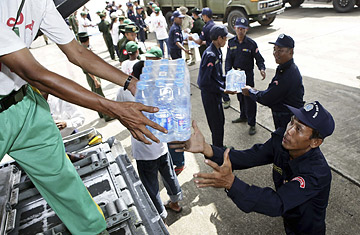
Burma military officials unload relief supplies for victims of Cyclone Nargis from an American C-130 plane at the Rangoon airport.
Burma's state-run media continues to portray a well-oiled state relief campaign: soldiers unloading relief supplies from helicopters, generals inspecting neat rows of refugee tents. Government propaganda is also used to justify the curtailment of most foreign assistance. This week the junta has ejected almost every expatriate aid worker from the disaster area. The people of Burma will "accept any kinds of foreign aid with appreciation," comments The New Light of Myanmar, a mouthpiece of the ruling junta. "However, they will not rely too much on international assistance and will reconstruct the nation on [a] self-reliance basis." The same article trumpets Burma's prompt delivery of aid to the delta before noting that, in the aftermath of Hurricane Katrina in 2005, "many people died of starvation" due to U.S. government neglect.
Propaganda will not change the deteriorating conditions in the delta. "There is an increase of people in the camps," writes an aid worker via satellite phone from the refugee-choked town of Laputta. "Heavy rain has caused flooding and worsened conditions and sanitation." There have been some cases of cholera, although so far the rate is "no greater than the background rate that we would be seeing in Myanmar during this season," a World Health Organization representative said today. Nearly 78,000 people are dead and 56,000 are missing, announced state television, almost doubling the previous count.
Meanwhile, foreigners — including aid workers, diplomats and undercover journalists — trying to enter the delta have been turned back at police checkpoints. Burmese citizens who have traveled down to the stricken Irrawaddy delta to distribute aid are aghast. "If our government really sympathized with these people," says travel agent Chin Chin, who traveled down to deliver aid herself, "it would be helping them more effectively."
Sometimes, the propaganda appears even more starkly as if coming from a parallel reality. On Thursday, the junta announced the barely credible results of its referendum on a new constitution that would extend its hold on the country. The vote had been held in the cyclone's aftermath. More than 92% of voters supposedly said "yes," with a turnout of 99%. The plebiscite was delayed in Rangoon and the delta, but apparently the junta still expects the region's stricken people to vote on May 24. But the true sentiment of the country cannot be masked by propaganda. If you want to gauge the support for Burma's military leaders, just ask anyone who has seen their neglect of the cyclone's victims. "We have hated our government for 20 years," says travel agent Chin Chin, as she prepares for a second relief trip. "Now we hate them more."
